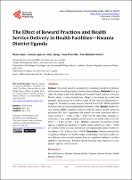| dc.contributor.author | Opio, Moses | |
| dc.contributor.author | Agweta, Cosmas | |
| dc.contributor.author | Ejang, Mary | |
| dc.contributor.author | Picorella, Irene | |
| dc.contributor.author | Okello, Tom Richard | |
| dc.date.accessioned | 2022-06-14T07:09:03Z | |
| dc.date.available | 2022-06-14T07:09:03Z | |
| dc.date.issued | 2022 | |
| dc.identifier.citation | Opio, M., Agweta, C., Ejang, M., Picorella, I., & Okello, T. R. (2022). The Effect of Reward Practices and Health Service Delivery in Health Facilities— Kwania District Uganda. Journal of Human Resource and Sustainability Studies, 10, 223-231.https://doi.org/10.4236/jhrss.2022.102014 | en_US |
| dc.identifier.uri | https://doi.org/10.4236/jhrss.2022.102014 | |
| dc.identifier.uri | https://hdl.handle.net/123456789/415 | |
| dc.description.abstract | Purpose: This study aimed to examine the relationship and effect of intrinsic
and extrinsic reward practices on health service delivery. Methods: Data was
collected prospectively from Thirteen Government health facilities in Kwania
District using a cross-sectional study design. A structured, pre-coded and
pretested questionnaire of Cronbach Alpha of 0.82 was self-administered to
sample of 132 health workers randomly selected from HCIV, HCIII and HCII
in Kwania District between September-November 2020. Results: Health Service
Delivery (HSD) correlates positively with the various reward system. In
particular, HSD has a significant and positive but weak correlation with intrinsic
reward (r = 0.260, p value = 0.05). On the other hand, extrinsic rewards
have a very weak insignificant but positive correlation with service delivery
(r = 0.126. p value > 0.05). Multiple regression: the intrinsic reward
appears a significant predictor of health service delivery (p value < 0.009,
β = 0.169 ), but the extrinsic reward does not significantly predict health service
delivery, (β = 0.001, p value = 0.985). Conclusion: Intrinsic rewards have
a significant influence on health workers’ performance and hence health service
delivery while extrinsic rewards have no significant influence on these
employees’ performance. Extrinsic reward becomes more important as employees’
ages increase on the job. | en_US |
| dc.language.iso | en | en_US |
| dc.publisher | Journal of Human Resource and Sustainability Studies | en_US |
| dc.subject | Reward Practices | en_US |
| dc.subject | Intrinsic Reward System | en_US |
| dc.subject | Extrinsic Reward System | en_US |
| dc.subject | Health Service Delivery | en_US |
| dc.title | The Effect of Reward Practices and Health Service Delivery in Health Facilities—Kwania District Uganda | en_US |
| dc.type | Article | en_US |

